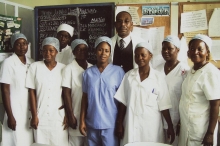Recruitment and retractable syringes: SOLISCO-DRC rebuilds for its members and saves lives

The PSI affiliate SOLISCO, which represents nurses, is well organised. It has over 17,500 members and through the check-off system, it receives a sustainable resource base which secures its independence. The union rents an office with computers and hires staff to run the office. Every Wednesday, during the allocated time negotiated with the employers, union leaders plan campaigns, study circles and other activities. The union has a relatively high media profile and is well regarded by senior medical staff, government officials and Ministers.
Had SOLISCO been based in another country, this level of organisation might be unremarkable. But it is remarkable because SOLISCO’s membership is in the Democratic Republic of the Congo where the destruction and human suffering from over two decades of war is well documented.
Behind this success story is persistent hard work. Dating back to 2001, when SOLISCO had just 5,750 members with few women leaders and when many of its provincial committees were non-operational, IMPACT’s support was critical. The earlier project phases helped SOLISCO to strengthen the capacity of its Women’s Committee, rebuild provincial structures and recruit members.
“Getting the check-off system required a lot of lobbying because the health Ministry had to approve it and the Financial Ministry had to implement it. So there were many explanations and thorough analysis on the way to move forward. Many other unions in more stable countries in this region are still struggling with this,” explains Kamissa Dembele, PSI Sub-Regional Secretary for French-speaking Africa.
Between 2009 and 2011, SOLISCO raised awareness about the risks of exposure to Hepatitis, HIV and even Ebola virus from needle-stick injuries when using traditional syringes and advocated for retractable syringes. In this way, SOLISCO could improve occupational health and safety of health professionals in public practice and at the same time attract more members.
After training carried out in six provinces, 702 trained nurses - 58% of whom were women - continued to raise awareness once back at their workplaces through study circles and occasional debates. The project also supported 34 General Assemblies held by SOLISCO to raise the awareness of more than 10,000 health workers, provincial Ministers and senior officials from the Ministry of Health. Additionally, the general public was sensitised though 75 television broadcasts; provincial sales of retractable syringes rose greatly; and the union’s membership rose by 10% each year. The unions’ early success in convincing the Minister of Health to change the country’s syringe procurement practice by ministerial decree in 2007 is unfortunately not yet implemented, but the union continues to lobby for this change.
Today the average nurse’s salary is (US) $100 a month. This is a big improvement although not enough and many nurses still work for far less. Kamissa explains how the nurses cope:
“The first time I went to Kinshasa, I realised that all the nurses had a garden where they grow their own food – vegetables, fruits and leafy plants – just so they can feed their families. I was shocked. Moving around the country is still very difficult. Just to travel 100km to a workshop by car can take a whole day. But despite these conditions they are a very effective union and have managed to do some very good work”.
For a complete survey of IMPACT/PSI trade union development cooperation between 2008 and 2013 click here: In the People's Interest
Map: IMPACT/PSI project collaboration between 2008 and 2013

